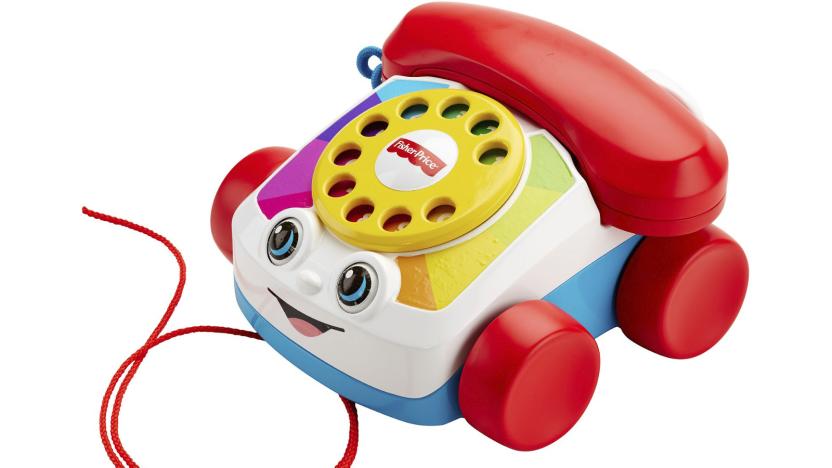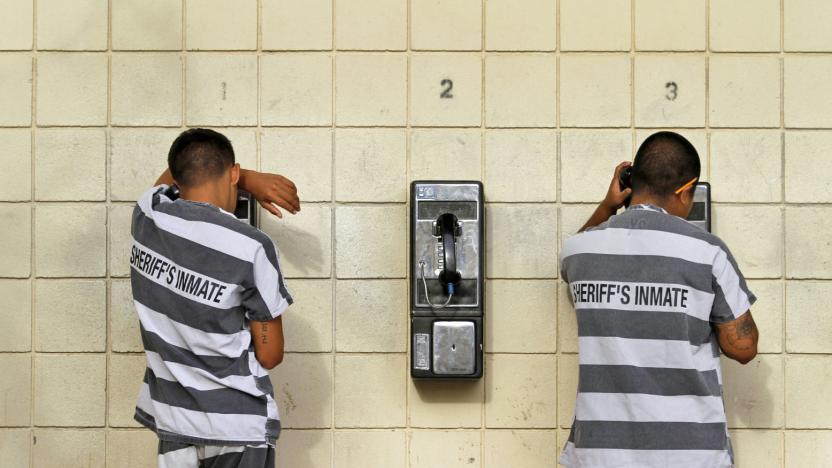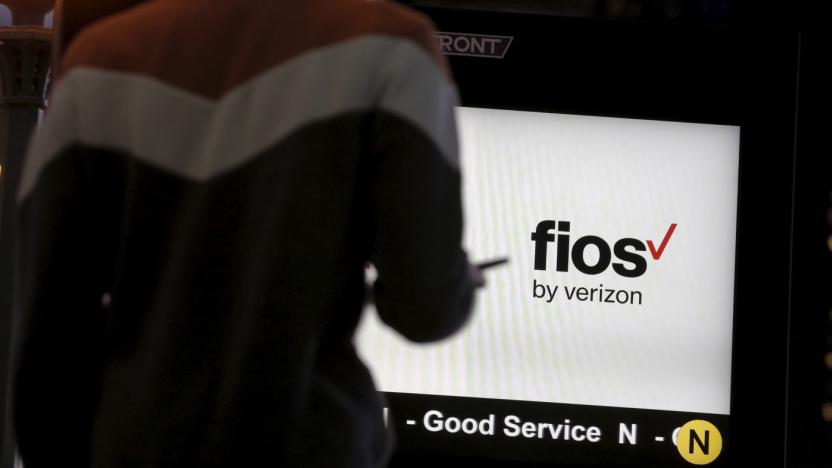telephone
Latest

Fisher-Price made a working Chatter telephone for adults
Fisher-Price has launched a working Chatter phone for adults.

This week in tech history: The birth of the internet and the first telephone call
At Engadget, we spend every day looking at how technology will shape the future. But it's also important to look back at how far we've come -- that's what This Week in Tech History will do. Join us every weekend for a recap of historical tech news, anniversaries and advances from the recent and not-so-recent past. This week, we're looking back at the creation of the internet, the first successful telephone call and the birth of the man who shaped modern physics as we know it.

FCC stops defending caps on prison phone call rates
The Federal Communications Commission's new anti-regulation stance is now affecting prisons. BuzzFeed News reports that the FCC is no longer defending two key parts of its caps on prison phone call rates: limits on intrastate call rates and the methods used to determine those rates. Ultimately, it's expected to push for eliminating the caps altogether. While this doesn't end litigation from phone service providers attempting to overturn the caps (they're merely on hold, not scrapped), it finds the FCC supporting the very companies it was challenging just weeks earlier.

UK telephone boxes to be turned into tiny offices
Some of the UK's iconic telephone boxes will soon be converted into small personal offices. Bar Works, a company operating a trio of co-working spaces in New York, has leased 15 of BT's old call receptacles in London, Leeds and Edinburgh. They'll soon be kitted out with WiFi access, a printer and scanner, a 25-inch monitor, a wireless mouse, a plug powerbank and a hot drinks machine. Aimed at entrepreneurs, the "Pod Works" subscription will run you £19.99 per month and net you access to any box, at any time of day or night. Access will be regulated through a smartphone app.

Verizon policy: switch from copper to fiber, or no fix for you
It won't shock you to hear that Verizon is not so fond of copper phone lines (just ask those left out in the cold after Hurricane Sandy), but it's now clear exactly how the carrier plans to make you ditch those old wires. The Philadelphia Inquirer has obtained documents detailing a longstanding "Fiber is the Only Fix" policy that effectively forces you to move to a fiber optic connection if you want assistance. If you ask for repairs on copper phone service in an area where fiber is available, technicians are supposed to tell you that the only remedy is to move to the newer technology. Decline, and you won't get any help -- Verizon's official stance is to refuse repairs on copper.

Phone companies ditching copper wires will have to follow the rules
The age of the copper land-line is nearing its end, but traditional phone lines aren't going quietly: new rules from the FCC now require service providers notify customers of the impending removal and drawbacks of switching to a VOIP line three months before killing a copper network. It sounds like a reasonable move -- customers need to know that the technology replacing their traditional land-line won't work during a power-outage without an external power source -- but not everybody at the FCC is happy with the new rules.

Wikileaks: US government recording every call from Afghanistan
When The Intercept revealed mass NSA "full-take" call recording in the Bahamas and other nations, it declined to name another, sensitive country, citing US concerns about violence. Now Wikileaks has claimed that the nation in question is Afghanistan and said the NSA is bluffing about any possible danger to folks there. In the Wikileaks blog, Julian Assange said that the US has made such statements before and it has never seen any evidence of increased violence following leaks. On the other hand, it's easy to see why the US government wouldn't want such information public, given its war against terrorists in Afghanistan. But Assange countered that the press has no obligation to protect a country like the US if it engages in "ongoing crimes" against an entire nation. He added that's especially true when such calls are sometimes used to target drone strikes, which often kill innocent civilians. The US government has yet to comment on the matter.

AT&T's new fiber optic phone network could delay disaster response
AT&T wants to put its old copper-based telephone networks to rest and start testing its next-gen fiber optic cables in more locations outside the initial ones in Florida and Alabama. There's just one not-so-tiny problem: this new high-speed technology doesn't work with the government's special telephone service for national emergencies, according to the Department of Homeland Security. High-level authorities access a priority line called Government Emergency Telecommunications Service (GETS) during, say, times of disaster or terrorist attacks when phone lines are usually clogged. Without that priority line, authorities would have to brave clogged phone networks to communicate with each other, and that could delay first responders and affect response or rescue operations as a whole.

US phone companies to explore replacing all phone numbers with IP addresses
Voice-over-IP (VoIP) is nothing new, of course, but so far it's been regarded merely as an add-on to America's regular, analog-based copper and cellular voice networks -- networks that are currently maintained as a matter of legal requirement. The FCC isn't necessarily such a stickler for tradition, however, as it is now encouraging phone networks to explore what would happen if VoIP replaced everything else. In other words, how would the system cope if the only phone numbers were Internet Protocol addresses; if even emergency calls were transmitted over the web; and if remote rural communities became dependent on VoIP, with no other type of network as a backup? Companies that want to participate in the experiment have until late February to submit their ideas, with approvals expected to be granted as early as March -- but don't fear, the tests will only be permitted in "discrete geographic areas or situations," which is the FCC's way of politely reminding telecom providers not to get ahead of themselves.

FTC reveals $50,000 Robocall Challenge winners, alarms Rachel from card services (video)
The FTC has managed to find two non-violent solutions to its Robocall Challenge, aimed at blocking auto-dialing telemarketers, thanks to winners Serdar Danis and Aaron Foss. The pair, who will receive $25,000 each, came up with variations on a system that would pre-screen calls before ringing your phone while allowing the FTC to blacklist known scammers at the same time. Google took a non-cash prize in a separate category with a scheme that would foil caller-ID spoofing often used by boiler rooms like the notorious "Rachel from card services" outfit, which has over a hundred numeric aliases. The FTC receives a whopping 200,000 complaints per month about the nuisance and screened nearly 800 submissions (see the More Coverage link), many of which show a certain, shall we say, passion for the topic. Check winner Foss' video submission after the break.

AT&T Wireless Home Phone goes prepaid, emulates landlines on demand
We can't say that most attempts to replicate the landline experience with a wireless link have panned out -- Verizon Hub, anyone? AT&T is wagering that it can overcome some of that hesitance with new prepaid tiers for Wireless Home Phone. Those who plug their wired phones into the $100 cellular hub can now pay only for those times they want pseudo-traditional service, whether it's $20 per month for unlimited US-wide calls or $15 for 1,000 minutes of international long distance. It's hard to make a case for the new Wireless Home Phone option when many of us already have cellphones, but we can see its uses: think snowbirds or apartment dwellers who want a cheap, traditional phone option that will follow them around for a few months at a time. If you haven't (or can't) cut the cord entirely, AT&T may have the next best thing.

France investigates Skype after it doesn't register as a telecom provider (update: Skype response)
You can't completely pigeonhole Skype when it serves both as a partial substitute for traditional phone service and an instant messaging service with voice and video on top. Unfortunately, French telecom regulator ARCEP doesn't trade in ambiguities. It's launching an investigation into Skype after the Microsoft-owned division reportedly ignored requests to register itself as a telecom provider in the country. The authority is concerned that Skype is offering phone service without following local laws, including requirements to offer emergency calls and avenues for legal wiretaps. We've reached out to Skype for its side of the story, although there's no certainty that ARCEP will have to take action, regardless -- Skype has long disclaimed that it's not a full phone replacement and won't work for true emergencies. If France asks for compliance, however, Skype may have to either solve a seemingly unsolvable problem or face withdrawing at least some of its services. We wouldn't count on always having VoIP in Versailles. Update: A Skype spokesperson answered back, and the company's view is clear: it doesn't believe that its service fits the definition of a communication provider under French law and thus doesn't have to be registered. Skype adds that it's been talking with ARCEP and plans to keep that up in a "constructive" fashion, although there clearly hasn't been much progress on that front. Read the full response after the break. [Image credit: Alexandre Vialle, Flickr]

Build a better payphone: NYC hosts public design challenge to reinvent public telephones
New York City's SmartScreen payphone refits may be revitalizing a handful of its 11,000 public kiosks, but the information scrubbing touchscreens lack a key communication feature: a telephone. With its existing payphone vender agreements due to expire in 2014, the city sees an opportunity to revitalize its communication infrastructure, and is asking the public to help them build the payphone of tomorrow. There's room for hardware innovation -- the city says most payphone locations can be augmented with fiber connections, opening the potential to expand functionality beyond basic voice calls. Designers are challenged to propose solutions that enhance local aesthetics, utilize sustainable power sources, combat vandalism, account for emergency scenarios, ensure accessibility to disabled persons and, of course, generate at least as much revenue for the City of New York as contemporary payphones. Entrants have until February 18th to submit their prototypes and designs, and 15 semi-finalists will have to face down a panel of judges in March. Want to get started? Check out the project's home page at the adjacent source link, and dig in -- the city is offering resources on payphone locations, WiFi service metrics and a Collabfinder page to help prospective designers find a team.

BT lets site visitors add features to landlines with only a phone number and postcode
If you're subscribed to BT's landline phone service, you may want to keep an eye on your bill in the near future. The British provider recently patched up a website issue that showed account holders' full names, but attention is being drawn to an approach that lets visitors add paid features like TV service using only an account's phone number and postcode as credentials. When both of these are potentially in the public eye, that creates understandable concerns that a rogue agent could hike someone's rates without consent -- even the email address BT uses to confirm changes is only chosen on the spot, which could keep the change a secret early on. BT so far contends that the light security is for "customer convenience," although we've reached out to verify whether or not that will continue to be the company's policy going forward. In the meantime, those still on the carrier's traditional phone service will want to be careful about giving out their number to strangers; while the risk isn't extreme in practice, there's no need to hand someone the keys to the kingdom.

FTC offers $50,000 prize for stopping illegal robocalls, we could have used this a few months ago
Robocalling is considered a plague in the modern phone world, especially during an election year -- and while you likely won't get rid of all the pitches from political candidates anytime soon, most of the commercial calls are outright illegal. The Federal Trade Commission has devised a unique contest to help cut back on those law-breakers without having to chase down every shady debt relief offer. It's offering a $50,000 reward for the cleverest solution to blocking the banned variety of robocalls. The only requirement is that you be an adult US resident: if you can invent a surefire remedy in your basement, the FTC wants to hear from you. Entries will be open between October 25th and January 17th, with word of a winner around April 1st. We're hoping that the champion has a truly effective cure in use before long, because we'll undoubtedly have reached our breaking point on robocalls by... oh, around November 6th. [Image credit: SarahNW, Flickr]

DIY Cellphone has the footprint of an ice cream sandwich, definitely doesn't run ICS (hands-on)
Building your own wireless communications device isn't for the faint of heart, or the law-abiding -- the FCC tends to prefer placing its own stamp of approval on devices that utilize US airwaves, making a homegrown mobile phone an unlikely proposition. That didn't stop a team at the MIT Media Lab from creating such a DIY kit, however. Meet the Do-It-Yourself Cellphone. This wood-based mobile rig, while it's currently in the prototype phase (where it may indefinitely remain), would eventually ship with a circuit board, control pad, a fairly beefy antenna and a monochrome LCD. Sounds like it'd be right at home at some kid's garage workshop in the early '80s, not showcased at an MIT open house. The argument here is that people spend more time with their phone than with any other device, so naturally they'd want to build one to their liking. Nowadays, folks expect their pocketable handset to enable them to not only place and receive phone calls, but also store phone numbers, offer a rechargeable battery, and, well, in some cases even send and receive email, and surf the web -- none of which are available with such a kit. The prototype we saw was fully functional. It could place calls. It could receive calls. There was even Caller ID! The phone does indeed feel homemade, with its laser-cut plywood case and a design that lacks some of the most basic gadget essentials, like a rechargeable battery (or at very least some provisions for replacing the 9-volt inside without unscrewing the case). Audio quality sounded fine, and calls went out and came in without a hitch -- there's a SIM card slot inside, letting you bring the nondescript phone to the carrier of your choice. Does it work? Yes. Is it worth dropping $100-150 in parts to build a jumbo-sized phone with a microscopic feature set? No, there's definitely nothing smart about the DIY Cellphone. If you want to throw together your own handset, however, and not risk anyone questioning the legitimacy of your homemade claim, you might want to keep an eye out for this to come to market. The rest of you will find everything you need in the video just past the break. We're just happy to have walked away without any splinters.

Motorola HS1101 and MBP2000PU Android Home Phones get examined, detailed by the FCC
We imagine that the vast majority of Android users have since abandoned or even eliminated landline service, but if you're still tethered to the grid at the homestead, your DECT cordless might as well be running Android. Motorola demonstrated such a concept at an event way back in 2010, and it now looks like the company may finally be readying a pair of production models, dubbed the HS1101 and MBP2000PU Android Home Phones. Based on published user manuals, both of the handsets appear to be virtually identical, with the exception of color scheme -- the HS1101 is covered in a glossy black finish, while the MBP2000PU is decked out in silver and white.The WiFi-equipped handsets could be running Ice Cream Sandwich (based on a screenshot of the HS1101), and each include a 3.2-inch 400 x 240 LCD, a front-facing camera with video capture, stereo 1.5-watt speakers, microSD storage, along with micro-USB and a standard headphone port. Naturally, you'll be able to download apps (through SlideMe), while some selections, including an Aldiko e-book reader and a Digital Answer Machine come preloaded. Whether or not consumers ever plan to buy another cordless set remains to be seen, but if you're in the market, you might as well hang tight for a Motorola Android Home Phone. Both models have passed through the FCC, so the grueling wait for an ICS-powered DECT cordless may soon come to an end. Jump past the break for a closer look at both models, or hit up the source link to thumb through those meaty manuals.

Apple WALT prototype hits eBay, reminds us of a life with landlines
As it turns out, Apple too used to announce products at trade shows... only to never actually ship them. Back in the halcyon days of the early '90s, Apple revealed the WALT (Wizzy Active Lifestyle Telephone) at Macworld Boston, touting a fairly amazing feature set. Things like a touchscreen, handwriting recognition, fax support, an address book, caller ID, online banking and a speakerphone set it apart from the landline devices of its day, and being that it was co-developed with Bell South, it's pretty clear that your pops had his eye one at some point. Those looking to relive the corporate boom of one-nine-nine-to-the-tres can plunk down $8,000 of 2012's dollars at the eBay link below; just don't expect it to work out of the box, okay?[Thanks, TS]

Plantronics Clarity Fortissimo speakerphone hands-on (video)
Music aficionados will recognize the term "fortissimo." It's used to signify belting out the tunes as loud as humanly possible, which is exactly what Clarity is hoping to achieve with its speakerphone that uses the name. The Clarity Fortissimo is geared toward those who are mobility-challenged, offering a massively loud 95dB speaker, huge buttons, voice activation, Bluetooth and DECT connectivity, and a large touchscreen display. The Fortissimo offers Plantronics' Vocalyst technology, which has the ability to push emails, messages and even social network updates. It also has a dedicated button that automatically dials Clarity's support center, where a rep can then program the phone remotely for you. Expect to see the Fortissimo available this spring -- we were quoted April / May -- and will retail for $500. We have images and video after the break.

Archos trots out Android-based DECT home phone, 35 Home Connect radio
They're hardly as exciting as the company's two new Android 3.1 tablets, but if you're looking for Android in even more places, look no further. Also being unveiled today is the 35 Home Connect, a self-proclaimed Android web radio that should do wonders by your bedside, or kickin' it on the beach. You heard right -- there's a built-in battery here, as well as WiFi access to over 50,000 web radio stations. You'll also find a touch panel, pre-loaded TuneIn application and an alarm clock function that brings together traffic, weather and whatever's happening in your neck of the woods. Finally, a video chatting app is tossed in for good measure, but it's only useful when your front-facing camera isn't handling baby monitoring duties (yeah, seriously!). Moving right along, there's the Archos 35 Smart Home Phone, an Android-based landline phone that brings users contact sharing with their Android smartphone, MP3 ringtones, caller photo display as well as access to your current stable of Android apps. In other words, this is likely the only home phone you'll find that can also video call, check your email, look up a topic on Wikipedia and satisfy gramps. The above-mentioned 35 Home Connect should ship this September for $149, while the 35 Smart Home Phone does likewise for $10 more. %Gallery-127008%








